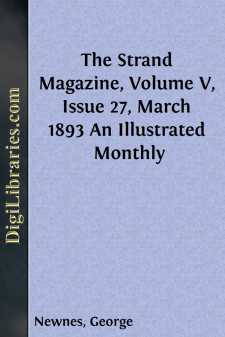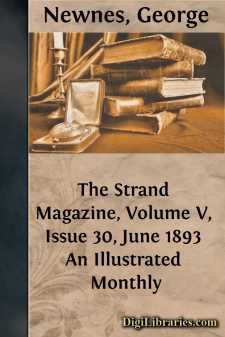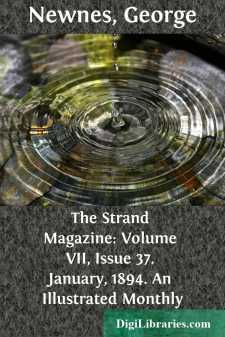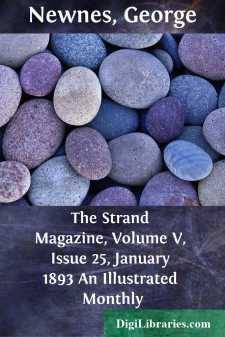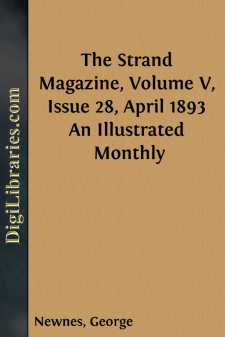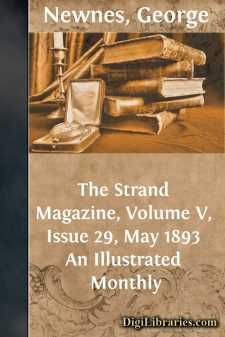Categories
- Antiques & Collectibles 13
- Architecture 36
- Art 48
- Bibles 22
- Biography & Autobiography 813
- Body, Mind & Spirit 142
- Business & Economics 28
- Children's Books 15
- Children's Fiction 12
- Computers 4
- Cooking 94
- Crafts & Hobbies 4
- Drama 346
- Education 46
- Family & Relationships 57
- Fiction 11828
- Games 19
- Gardening 17
- Health & Fitness 34
- History 1377
- House & Home 1
- Humor 147
- Juvenile Fiction 1873
- Juvenile Nonfiction 202
- Language Arts & Disciplines 88
- Law 16
- Literary Collections 686
- Literary Criticism 179
- Mathematics 13
- Medical 41
- Music 40
- Nature 179
- Non-Classifiable 1768
- Performing Arts 7
- Periodicals 1453
- Philosophy 64
- Photography 2
- Poetry 896
- Political Science 203
- Psychology 42
- Reference 154
- Religion 513
- Science 126
- Self-Help 84
- Social Science 81
- Sports & Recreation 34
- Study Aids 3
- Technology & Engineering 59
- Transportation 23
- Travel 463
- True Crime 29
The Strand Magazine, Volume V, Issue 27, March 1893 An Illustrated Monthly
by: George Newnes
Description:
Excerpt
From the French.
I.
King Phillip II. was playing at chess in the Escurial Palace. His opponent was Ruy Lopez, a humble priest, but a chess player of great skill. Being the King's particular favourite, the great player was permitted to kneel upon a brocaded cushion, whilst the courtiers grouped about the King were forced to remain standing in constrained and painful attitudes.
It was a magnificent morning. The air was perfumed with the orange groves, and the violet curtains of the splendid hall hardly softened the burning rays which streamed in through the windows. The blaze of living light seemed scarcely in harmony with the King's gloomy countenance. His brow was black as night, and from time to time he bent his eyes impatiently upon the door. The nobles stood in silence, darting meaning glances at each other. It was easily to be discerned that some event of great importance weighed upon the spirits of the assembly. No one paid any attention to the chess-board except Ruy Lopez, who, as he moved the pieces, hesitated between the temptation of checkmating his opponent and the deference due to his King. The silence was unbroken except by the sound made by the players moving their pieces.
Suddenly the door opened, and a man of rude and savage aspect advanced into the hall, and, presenting himself before the King, stood waiting his commands to speak. This man's appearance was anything but prepossessing, and on his entrance the nobles, as if animated with one thought, shrank back with contempt and loathing, as if some unclean animal had entered into their midst. His massive, herculean figure was clad in a doublet of black leather, and his face, in which could be seen no trace of intelligence, expressed, on the contrary, nothing but vileness and villainy; a great scar, running right across his face and losing itself in a bushy beard, added still further to the natural brutality of his countenance.
An electric thrill ran through the assembly. The new comer was Fernando Calavar, high executioner of Spain.
"Is he dead?" asked the King, in an imperious tone.
"No, sire," replied Calavar, bowing low.
The King frowned.
"Great Sovereign of Spain," Calavar continued, "the prisoner has claimed his privileges, and I cannot take proceedings against a man whose blood belongs to the noblest in Spain, without having a more imperative order from your Majesty," and he bowed again.
The nobles, who had listened with great attention to these words, broke into a murmur of approbation as the man finished speaking. The proud Castilian blood rushed like a stream of lava through their veins, and dyed their faces crimson. The manifestation became general. Young Alonza D'Ossuna openly asserted his opinion by putting on his plumed cap. His bold example was followed by the majority of the nobles, and their lofty nodding crests seemed to proclaim with defiance that their masters protested in favour of the privilege, which the hidalgos of Spain have always enjoyed, of covering their heads before their Sovereign....


